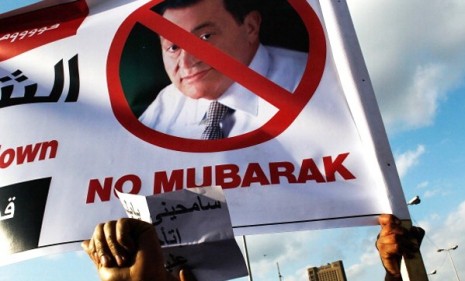The Egypt effect: How other Arabian rulers are reacting
As the world wonders if another "domino" country will fall after Egypt, autocratic regimes are trying to placate the masses before they take to the streets

A free daily email with the biggest news stories of the day – and the best features from TheWeek.com
You are now subscribed
Your newsletter sign-up was successful
Bowing to pressure from hordes of protestors in Cairo on Tuesday, Egyptian President Hosni Mubarak agreed not to run in his country's fall elections. Although Mubarak's concession failed to quell unrest in the country, he's not the only Middle Eastern leader grasping for ways to placate the revolutionary masses congregating in cities across the region. Here, a quick guide to how the embattled dictators are reacting:
The King of Jordan installs a new leader
King Abdullah of Jordan dismissed Prime Minister Samir Rifai on Tuesday as protests in the oil-rich desert nation threatened to spiral out of control. (Watch a CNN discussion about King Abdullah's decision.) Jordanians are angry about rising food prices and the country's high levels of inflation and unemployment. But some doubt that the king's new choice for prime minister, an ex-army general considered to be a member of the establishment, will satisfy protesters hungering for real change. "This has created a shock which will backfire more than help the current situation," a Jordanian analyst told the BBC.
The Week
Escape your echo chamber. Get the facts behind the news, plus analysis from multiple perspectives.

Sign up for The Week's Free Newsletters
From our morning news briefing to a weekly Good News Newsletter, get the best of The Week delivered directly to your inbox.
From our morning news briefing to a weekly Good News Newsletter, get the best of The Week delivered directly to your inbox.
The Yemeni president takes the fall
As protests mount in Yemen, President Ali Abdullah Saleh — a U.S.-backed leader who's been in power for 23 years — announced that he will not seek re-election after his term ends in 2013. The president also promised that his son, head of the country's Republican Guard, would not run. Saleh's move, reports The New York Times, is a "stunning concession to protesters." But, says Joshua Keating at Foreign Policy, "like Egypt and Tunisia before it, the offer has not placated the demonstrators on the streets of Sana'a, and a new mass protest has been called for Thursday."
Syria offers political reform
Syria's President Bashar al-Assad is "nervous," says Kenneth Bandler at Fox News. The 44-year-old dictator, who assumed power from his father in 2000, is offering unprecedented political reforms to the Syrian people, including municipal elections, "more power to non-governmental organizations," and "a new media law." Still, mass protests are planned for this weekend, and "Syria is looking more and more like a prime candidate to be the next Arab government to confront its own restless population."
A free daily email with the biggest news stories of the day – and the best features from TheWeek.com
Sudan stamps out dissent
President Omar al-Bashir has "clamped down hard" on protesters in Sudan, arresting more than 100 people in a bid to stem a wave of demonstrations. Inspired by the Egyptian uprising, residents of the African country are protesting against rising oil and food prices. A larger demonstration is planned for Thursday, which, says James Copnall at the BBC, will "give a better indication of how much momentum the young protesters can muster."
Libya and Algeria ban soccer games
Fearful that organized soccer fans played a key role in orchestrating protests in Tunisia and Egypt, authorities in Libya and Algeria have scratched a number of games over the next weeks. Algeria's game against Tunisia, scheduled for February 5, has been cancelled. Libya has suspended all soccer games indefinitely. "The cancellations are intended to prevent the pitch from becoming a platform for protests," says James M. Dorsey at Bleacher Report.
Saudi Arabia pledges improvements
Saudi Arabian authorities, meanwhile, moved to quell pockets of unrest in Jeddah, the country's second largest city, over recent flooding that has left thousands homeless. After detaining protesters, the authorities announced they would improve the city's infrastructure to avoid future floods, says Reuters.
-
 5 cinematic cartoons about Bezos betting big on 'Melania'
5 cinematic cartoons about Bezos betting big on 'Melania'Cartoons Artists take on a girlboss, a fetching newspaper, and more
-
 The fall of the generals: China’s military purge
The fall of the generals: China’s military purgeIn the Spotlight Xi Jinping’s extraordinary removal of senior general proves that no-one is safe from anti-corruption drive that has investigated millions
-
 Why the Gorton and Denton by-election is a ‘Frankenstein’s monster’
Why the Gorton and Denton by-election is a ‘Frankenstein’s monster’Talking Point Reform and the Greens have the Labour seat in their sights, but the constituency’s complex demographics make messaging tricky